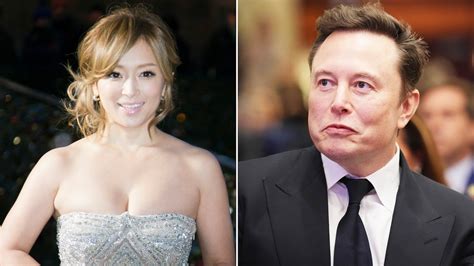
Japanese pop star Kano, of the musical duo Pii, has firmly denied rumors linking her to Elon Musk as the mother of his child, humorously stating, “Not my Elon!” in response to swirling speculation online.
Kano addressed the rumors head-on after online chatter, fueled by perceived similarities between her and Shivon Zilis, the Neuralink executive who had twins with Musk in November 2021, led some to believe she was secretly connected to the tech mogul. The rumors gained traction, particularly within Japanese online communities, prompting Kano to set the record straight.
“I’ve been seeing a lot of comments on social media,” Kano explained in a statement. “People are saying I look like the mother of Elon Musk’s children, but that’s not true. It’s not my Elon!” She further emphasized that she has never met Musk.
The situation highlights the often-bizarre nature of internet rumors and the potential for misinformation to spread rapidly, even internationally. It also underscores the intense public fascination with Elon Musk’s personal life, which often becomes fodder for speculation and unfounded claims.
The incident has generated significant buzz in both the Japanese and international press, with many outlets reporting on Kano’s denial and the origins of the rumor. Social media users have reacted with a mix of amusement and disbelief, with many praising Kano for her lighthearted response to the situation.
Context and Background
The rumors appear to have stemmed from a combination of factors, including the perceived physical resemblance between Kano and Shivon Zilis, the relatively limited information available about Zilis in certain online communities, and the general public interest in Musk’s personal affairs.
Shivon Zilis is the Director of Operations and Special Projects at Neuralink, a neurotechnology company co-founded by Musk. News of her twins with Musk surfaced in July 2022, adding to the already considerable public fascination with the billionaire’s life and family. Musk has fathered at least 12 children with three different women.
The online speculation surrounding Kano highlights the challenges faced by public figures in the age of social media, where rumors and misinformation can spread quickly and easily. Even seemingly harmless speculation can have unintended consequences, potentially impacting the reputations and personal lives of those involved.
Impact and Reactions
Kano’s denial has been widely reported and has effectively dispelled the rumors. Her humorous response has been praised by many as a clever way to address the situation without fueling further speculation. The incident serves as a reminder of the importance of verifying information before sharing it online and the potential harm that can be caused by spreading misinformation.
The episode also sheds light on the cultural differences in how public figures are perceived and treated. In Japan, there is often a greater emphasis on privacy and discretion, particularly when it comes to personal matters. Kano’s decision to address the rumors directly may have been influenced by a desire to protect her privacy and maintain her public image.
The incident involving Kano is not the first time Elon Musk’s personal life has been the subject of intense public scrutiny. His relationships, family size, and unconventional views on various topics have all drawn significant attention. This latest episode underscores the challenges of maintaining a private life while being a highly visible public figure in the digital age.
The spread of the rumors also points to the powerful role of online communities in shaping public opinion and disseminating information. Social media platforms have made it easier than ever for people to connect and share ideas, but they have also created new opportunities for misinformation to spread. It is important for individuals to be critical consumers of information and to verify the accuracy of claims before sharing them with others.
Detailed Analysis
The Kano-Musk rumor saga provides a fascinating case study in how misinformation spreads online. The initial spark likely came from a visual comparison – the perceived resemblance between Kano and Shivon Zilis. This initial observation, however superficial, was then amplified by the echo chambers of online communities, particularly within Japanese online spaces where information about Zilis might be less readily available. The inherent intrigue surrounding Elon Musk, a figure who commands both admiration and controversy, further fueled the flames.
The crucial element in debunking the rumor was Kano’s direct and unambiguous denial. Her humorous phrasing, “Not my Elon!”, served to defuse the situation and prevent it from escalating. This highlights the importance of public figures taking control of their own narratives in the age of social media. A simple denial might have been insufficient; the humor added a layer of personality and effectively shut down further speculation.
The incident also raises broader questions about the responsibility of social media platforms in combating misinformation. While platforms have implemented various measures to flag false or misleading content, these measures are often reactive rather than proactive. The Kano-Musk rumor demonstrates how quickly false information can spread, even if it is ultimately debunked. This suggests a need for more sophisticated algorithms and strategies to identify and address misinformation before it gains widespread traction.
Furthermore, the incident underscores the potential impact of seemingly harmless online chatter. While the Kano-Musk rumor may have appeared frivolous, it could have had negative consequences for Kano’s personal and professional life. The spread of false information can damage reputations, erode trust, and even lead to harassment and abuse. This highlights the importance of responsible online behavior and the need for individuals to be mindful of the potential impact of their words and actions.
The story also speaks to the globalized nature of online culture. The rumor, originating in Japan, quickly spread internationally, demonstrating the interconnectedness of online communities. This underscores the need for cross-cultural understanding and sensitivity when engaging in online discussions. Misunderstandings and misinterpretations can easily arise due to language barriers, cultural differences, and varying levels of familiarity with different public figures.
In conclusion, the Kano-Musk rumor saga serves as a cautionary tale about the power of misinformation, the importance of responsible online behavior, and the challenges faced by public figures in the digital age. It also highlights the need for greater media literacy and critical thinking skills to navigate the complex and ever-evolving landscape of online information.
The rumor highlights the rapid spread of misinformation in the digital age, fueled by online speculation and perceived similarities, and underscores the intense public interest in Musk’s personal life. This incident also underscores how cultural context and availability of information play a pivotal role in the generation and amplification of such rumors.
Lessons Learned
Several important lessons can be drawn from the Kano-Musk rumor incident:
- The Importance of Direct Communication: Kano’s direct and humorous denial was instrumental in quashing the rumors. Public figures need to be proactive in addressing misinformation that affects them.
- The Power of Humor: Using humor can be an effective way to defuse potentially damaging situations and prevent further escalation.
- The Responsibility of Social Media Platforms: Platforms need to continue developing strategies to combat the spread of misinformation and protect individuals from online harassment.
- The Need for Media Literacy: Individuals need to be critical consumers of information and verify the accuracy of claims before sharing them online.
- The Importance of Cross-Cultural Understanding: Online interactions often transcend geographical boundaries, making cross-cultural understanding and sensitivity essential.
- Protecting Personal Privacy: Public figures must navigate the challenges of maintaining their privacy in an era where personal information can easily be shared online.
- Impact of Speculation: Even seemingly harmless speculation can cause reputational damage and distress.
Long-Term Implications
The incident, while seemingly resolved, has some potential long-term implications:
- Increased Awareness of Misinformation: The widespread coverage of the incident may raise awareness about the ease with which misinformation can spread online.
- Heightened Scrutiny of Online Rumors: People may be more likely to question the validity of online rumors and seek out reliable sources of information.
- Changes in Social Media Behavior: Some individuals may be more cautious about sharing unverified information online.
- Impact on Kano’s Career: While the incident does not appear to have negatively impacted Kano’s career, it may have raised her profile and introduced her to a wider audience.
- Continued Interest in Musk’s Personal Life: The incident is unlikely to diminish public interest in Musk’s personal life, which will likely remain a topic of speculation and discussion.
- Potential for Legal Action: While Kano did not pursue legal action in this case, the incident highlights the potential for individuals to seek legal remedies against those who spread false and defamatory information about them online.
The Future of Online Rumors
The Kano-Musk rumor is just one example of the many false and misleading stories that circulate online. As technology continues to evolve and social media becomes even more pervasive, it is likely that online rumors will become even more sophisticated and difficult to detect. To combat this trend, it is essential to promote media literacy, support fact-checking organizations, and hold social media platforms accountable for the content that is shared on their sites. It is also important for individuals to be mindful of the potential impact of their online behavior and to avoid spreading misinformation, even if it seems harmless. Only through a concerted effort can we hope to create a more informed and responsible online environment.
Expanding the Narrative: Media Literacy and Fact-Checking
The Kano-Musk incident underscores the urgent need for improved media literacy among internet users. Media literacy encompasses the ability to access, analyze, evaluate, and create media in a variety of forms. It empowers individuals to critically assess information and distinguish between credible sources and misinformation.
In this context, media literacy would involve:
- Source Evaluation: Assessing the credibility and reliability of the source of information. Is the source known for accurate reporting? Does it have a clear bias?
- Fact-Checking: Verifying the accuracy of claims by consulting multiple sources and reputable fact-checking organizations.
- Critical Thinking: Questioning assumptions and considering alternative perspectives.
- Understanding Bias: Recognizing and accounting for potential biases in reporting.
- Recognizing Misinformation Tactics: Identifying common techniques used to spread misinformation, such as emotional appeals, conspiracy theories, and manipulated images or videos.
Fact-checking organizations play a crucial role in combating misinformation. These organizations employ trained journalists and researchers to verify the accuracy of claims made in news articles, social media posts, and other forms of media. By providing evidence-based assessments of factual claims, fact-checking organizations help to hold individuals and institutions accountable for the accuracy of their statements.
Examples of reputable fact-checking organizations include:
- Snopes: A long-standing fact-checking website that investigates a wide range of claims.
- PolitiFact: A fact-checking website that focuses on political claims.
- FactCheck.org: A project of the Annenberg Public Policy Center that focuses on factual accuracy in politics.
- AFP Fact Check: The fact-checking arm of Agence France-Presse (AFP), a global news agency.
- Reuters Fact Check: The fact-checking arm of Reuters, a global news agency.
By consulting these and other reputable fact-checking organizations, individuals can increase their ability to identify and avoid misinformation.
Cultural Nuances and the Japanese Entertainment Industry
The Kano-Musk incident also highlights the cultural nuances within the Japanese entertainment industry and how it intersects with global online culture. Japanese celebrities, particularly idols like Kano, often maintain a carefully cultivated public image, and there’s a strong emphasis on professionalism and avoiding scandals. Public perception is highly valued, and even seemingly minor controversies can have significant repercussions.
In Japan, there’s generally a greater degree of privacy afforded to public figures compared to some Western cultures. Sensationalist journalism is less prevalent, and there’s a stronger cultural norm against intruding on personal matters. This might explain why information about Shivon Zilis was less readily available within Japanese online communities, contributing to the speculation about Kano.
Furthermore, the concept of “idol culture” in Japan is unique. Idols are often marketed as pure, innocent, and approachable figures, and their relationships with fans are carefully managed. Any hint of scandal or impropriety can damage their carefully crafted image and alienate their fanbase. Therefore, Kano’s prompt and decisive response to the rumor was likely driven by a desire to protect her reputation and maintain the trust of her fans.
The incident also underscores the increasing globalization of online culture and the challenges of navigating cross-cultural communication. What might be considered a harmless joke or speculation in one culture could be perceived as offensive or intrusive in another. Therefore, it’s essential to be mindful of cultural differences when engaging in online discussions and to avoid making assumptions about individuals based on their nationality or cultural background.
Elon Musk: A Magnet for Controversy and Speculation
Elon Musk’s larger-than-life persona and unconventional views on a variety of topics make him a constant subject of public fascination and speculation. His business ventures, his personal life, and his often-controversial social media posts are all scrutinized by the media and the public.
Musk’s outspoken nature and willingness to challenge conventional wisdom have earned him both admirers and detractors. He is often praised for his visionary leadership and his commitment to solving some of the world’s most pressing problems, such as climate change and space exploration. However, he is also criticized for his sometimes erratic behavior and his tendency to make inflammatory statements.
His personal life has also been a source of intense public interest. His relationships, his family size, and his unconventional views on parenting have all drawn significant attention. The Kano-Musk rumor is just the latest example of how Musk’s personal life can become fodder for speculation and misinformation.
It is likely that Musk will continue to be a magnet for controversy and speculation in the years to come. His influence on technology, business, and culture is undeniable, and his actions will continue to be closely watched by the media and the public.
The Role of Artificial Intelligence (AI) in Combating Misinformation
While the Kano-Musk rumor was ultimately debunked through traditional methods, the incident highlights the potential for artificial intelligence (AI) to play a more significant role in combating misinformation in the future.
AI-powered tools can be used to:
- Detect Fake News: AI algorithms can analyze text, images, and videos to identify patterns and characteristics that are indicative of fake news.
- Verify Information: AI can be used to automatically fact-check claims by comparing them to credible sources of information.
- Identify Bots and Trolls: AI can detect bot accounts and trolls that are used to spread misinformation and harass individuals online.
- Personalize Media Literacy Education: AI can be used to tailor media literacy education to the specific needs and interests of individual users.
However, it is important to recognize that AI is not a silver bullet for combating misinformation. AI algorithms can be biased and can be manipulated by those who seek to spread false information. Therefore, it is essential to use AI in conjunction with human oversight and critical thinking skills.
Furthermore, the development and deployment of AI-powered tools for combating misinformation raise important ethical questions. It is important to ensure that these tools are used responsibly and that they do not infringe on freedom of speech or privacy rights.
Conclusion: A Case Study in the Digital Age
The “J-Pop Star Denies Musk Baby Mama Rumors” story, while seemingly trivial on the surface, provides a valuable case study in the complexities of the digital age. It highlights the rapid spread of misinformation, the importance of media literacy, the challenges faced by public figures in maintaining their privacy, and the potential for technology to both exacerbate and mitigate the problem of false information. It serves as a reminder that in the interconnected world of the internet, critical thinking, responsible online behavior, and a healthy dose of skepticism are more important than ever. The digital landscape is constantly evolving, requiring ongoing adaptation and refinement of strategies to combat misinformation and promote a more informed and responsible online environment. The story also serves as a reminder that cultural sensitivity and awareness are crucial when engaging in online discussions, as misunderstandings and misinterpretations can easily arise. The incident further underscores the importance of public figures taking control of their narratives and proactively addressing misinformation that affects them. Ultimately, the Kano-Musk rumor saga is a microcosm of the larger challenges facing society in the digital age, highlighting the need for ongoing vigilance and a commitment to truth and accuracy.
Frequently Asked Questions (FAQ)
1. Why were people speculating that Kano was the mother of Elon Musk’s child?
The speculation stemmed from a perceived physical resemblance between Kano and Shivon Zilis, who had twins with Elon Musk in November 2021. Coupled with limited information about Zilis in certain online communities, this led some to believe Kano was secretly connected to Musk.
2. How did Kano respond to the rumors?
Kano directly addressed the rumors in a statement, humorously saying, “Not my Elon!” She also emphasized that she had never met Elon Musk.
3. Has Elon Musk commented on this situation?
As of the latest reports and information available, Elon Musk has not publicly commented on the rumors involving Kano.
4. What does this incident say about the spread of misinformation online?
This incident illustrates how quickly misinformation can spread online, fueled by speculation, perceived similarities, and the intense public interest in figures like Elon Musk. It underscores the importance of verifying information before sharing it.
5. What are some steps people can take to avoid spreading misinformation?
To avoid spreading misinformation, individuals should: critically evaluate sources, fact-check claims before sharing, be aware of their own biases, and recognize common misinformation tactics. Additionally, it’s important to be cautious about information shared on social media and to seek out reliable news sources.









